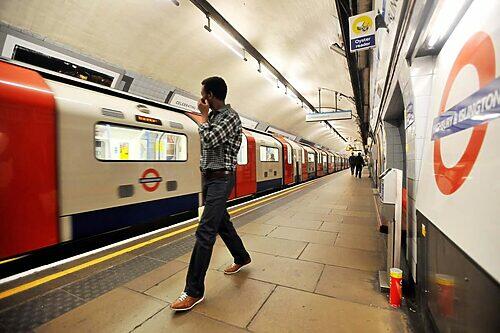T
ube strikes that would have caused chaos for millions of passengers on Wednesday and Friday have been called off.
The RMT union announced at lunchtime on Tuesday that the walkout by thousands of station staff had been cancelled and the dispute over job cuts was at an end.
It said there had been a breakthrough in talks with Transport for London at Acas. Sources suggested that about 200 jobs had been saved.
The strikes were the latest in a dispute that began in 2021 when TfL proposed axing of up to 600 station staff posts as it looked to make savings, in line with Government orders to break even this financial year following £5bn of covid bailouts.
It is understood that a deal that has been struck that will save about 200 posts - effectively meaning that between 300 and 400 vacant staff posts will not be filled, rather than between 500 to 600 as originally feared.
No Tube worker will lose their job or be required to work additional hours under the changes, which will allow TfL to deploy staff “more flexibly” to a wider number of stations.
Thousands of station staff belonging to the RMT were set to walk out for 24 hours on both Wednesday and Friday in a protest that union leaders expected to effectively shut the network.
But the RMT, in a surprise announcement, said it had “managed to save key jobs, prevent detrimental changes to rosters and secure protection of earnings around grading changes”.
It said that “significant progress” had been made - though further negotiations were needed on jobs, pensions and working agreements.
RMT general secretary Mick Lynch said: “I congratulate all our members who were prepared to take strike action and our negotiations team for securing this victory in our Tube dispute.
“Without the unity and industrial power of our members, there is no way we would have been able to make the progress we have.
“We still remain in dispute over outstanding issues around pensions and working agreements and will continue to pursue a negotiated settlement."
Talks had continued into Tuesday in a last-ditch effort to avert the strikes.
TfL’s Tube boss Nick Dent said: “We are pleased that the RMT has withdrawn its planned industrial action this week and that the dispute on our change proposals in stations is now resolved.
“This is good news for London and we will continue to work closely with our trade unions as we evolve London Underground to ensure we can continue to support the capital in the most effective way.”
It is the second time recently that Tube strikes have been averted at the 11th hour. A week of walkouts planned in July by the RMT and Aslef over staff pensions was suspended when guarantees were secured over pensions until 2026.
Normally Tube strikes go ahead, and it had appeared that both sides were still some distance apart on the changes to station staffing levels and rosters.
The news was welcomed by Sadiq Khan, who has faced regular criticism for the number of strikes on the Tube - despite a pledge before becoming mayor for there to be “zero days of strikes”.
Mr Khan has consistently urged the unions to keep talking rather than going on strike. But he has been accused by union leaders of not standing up strongly enough to the Government’s demand for savings at TfL.
Mr Khan said on Tuesday afternoon: “It is welcome news for Londoners that the RMT have suspended their planned Tube strikes this week and that London’s commuters won’t face disruption.
“Despite the onerous funding deal conditions imposed by the Government we have managed to avoid industrial action.
“Negotiation is always the best way forward and this shows what we can achieve by working with trade unions.
“I’ve been in close contact with the TfL commissioner throughout this week, and I’ll keep working with our TfL unions and staff to deliver the best transport system in the world for Londoners and visitors.”
Tube passenger numbers have stalled at about 85 per cent of pre-pandemic levels but TfL is expected to make an “operating surplus” of about £78m this financial year, though still needs Government support for major infrastructure projects.
The RMT said there were 98 station closures in August due to staff shortages – compared with 12 in August 2019.
“If London Underground does not reinstate the positions it has cut, this situation will continue and worsen,” it had warned.
Stations such as Lancaster Gate and Holland Park have recently been hit by repeated closures. RMT officials say there have been “especially drastic cuts” at Oxford Circus, Piccadilly Circus, and Charing Cross, with staffing levels “stretched to breaking point and stations often on the brink of closure”.
RMT members last walked out in March. There were also six strikes last year.
A national rail strike planned for Wednesday is still going ahead. This will bring much of the national rail network to a standstill, including no services on Southeastern, Thameslink and Avanti West Coast. Southern will only run a shuttle service between Victoria and Gatwick airport.
The Government has passed a law requiring “minimum service levels” during strikes but this cannot be used at present in relation to the Tube as ministers have yet to set a figure for TfL or London Underground.















